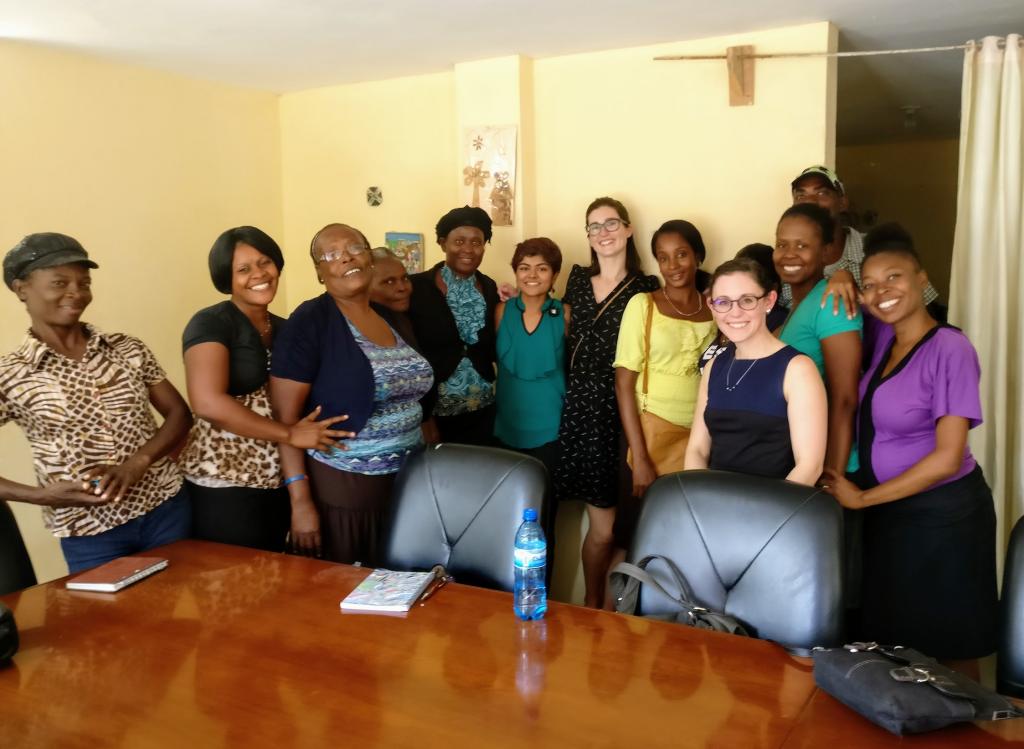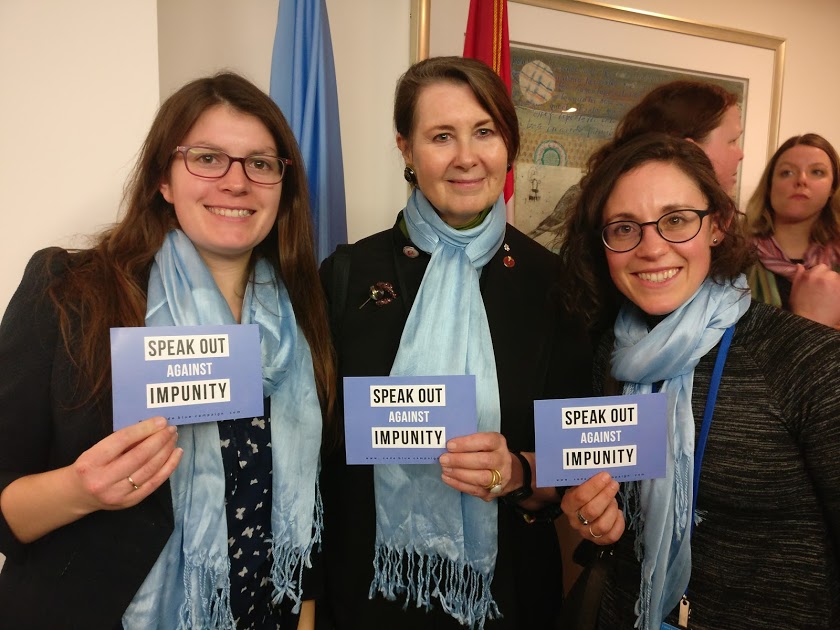Secondary menu
When Protectors of Peace Become Perpetrators of Sexual Exploitation and Abuse: IHRP & Code Blue Visit Haiti
30 March, 2017
Bethanie Pascutto (2L)

The Code Blue Campaign with advocates from the Federation des Femmes du Bas Artibonite. Photograph courtesy of the Code Blue Campaign.
Over the past several decades, the blue helmets of the UN’s Peacekeeping force have become a symbol of peace, international support, and hope. Or at least that was the objective. “United Nations Peacekeeping helps countries torn by conflict create the conditions for lasting peace,” the UN website reads.
Despite these high ideals, a closer look suggests a disturbingly different reality. In 2015, the international advocacy organization AIDS-Free World obtained internal UN documents that detailed sexual abuse perpetrated by peacekeepers in the Central African Republic. The documents exposed the UN’s extensive efforts to conceal the issue and its failure to hold any of the perpetrators to account. Over the last two years, it has become increasingly clear that this is a problem in other peacekeeping missions as well. While the UN has issued directives on sexual exploitation and abuse, and implemented a “zero tolerance policy,” it is extremely rare for peacekeepers to face justice for sexual exploitation and abuse.
In May 2015, AIDS-Free World set out to end the impunity of UN peacekeepers, with the launch of the Code Blue Campaign. As a clinic student of the International Human Rights Program, I had the opportunity to work with the Campaign, and in February, we travelled to Haiti to conduct a fact-finding mission. Our aim was to discover how the UN headquarters’ directives on sexual exploitation and abuse translated into action in the field.
The UN defines “sexual exploitation and abuse” as acts ranging from assault to transactional sex. The latter is considered sexual exploitation due to the substantial power imbalance between the parties, and the particular vulnerabilities of the victims. These transactions are not just monetary, but could include food, material goods, and the promise of citizenship in the peacekeeper’s home country.
While sexual exploitation and abuse is significantly underreported, the number of allegations brought forward against UN peacekeepers is staggering. According to the UN’s Conduct and Discipline Unit, between January 1, 2003 and January 31, 2017, there have been 1,759 reported allegations of sexual exploitation and abuse in UN peacekeeping missions.. Approximately one-third of the allegations since 2008 have involved at least one child. The allegations disproportionately originate from the UN peacekeeping missions in the Democratic Republic of the Congo and Haiti. Between 2007 and 2017, 109 allegations have been made against peacekeepers with the United Nations Stabilization Mission in Haiti (MINUSTAH).
Since 2003, the UN has issued numerous reports and adopted several Security Council and General Assembly resolutions related to sexual exploitation and abuse. These reports and resolutions include prescriptions for eliminating future crimes, and for assisting and supporting victims. While the UN now tracks allegations of sexual exploitation and abuse, it has not disclosed how these recommendations are implemented at the field level. Code Blue explored this question by speaking with members of the UN mission and local grassroots organizations in Haiti.
The UN has been in Haiti since 1990, when it first entered the country to observe the presidential elections. MINUSTAH was initiated after northern Haiti was captured by rebels in 2004, and the UN mission is still active today. MINUSTAH’s priorities have changed over the years as the situation in the country has evolved. The mission has supported multiple rounds of presidential elections, and provided humanitarian assistance after the earthquake in 2010 and the hurricane in 2016. MINUSTAH is currently in the process of reducing its presence in Haiti, and the UN expects to close the mission in the near future. The UN’s presence in Haiti has not been without controversy. Aside from allegations of sexual exploitation and abuse against hundreds of peacekeepers in the mission, the UN Secretary-General admitted that the UN was responsible for a massive cholera outbreak that killed almost 10,000 people and infected over 700,000.
The Code Blue delegation met with multiple departments of MINUSTAH. During the meetings, the UN representatives were willing to discuss the reporting and investigation process but did not expand on the information provided by UN headquarters. While we did not receive detailed information on individual cases, it was clear that the division responsible for coordinating the response to allegations of sexual exploitation and abuse were at least aware of the procedures set by the Security Council and by the Secretary-General of the UN.
Our meetings with the grassroots organizations were eye-opening and rewarding. The advocates that we met work on issues of gender-based violence under very challenging circumstances. Yet, they were happy to help and generously shared information, including on instances of sexual exploitation and abuse and the consequences that victims face for reporting those violations to the UN. The advocates also offered to collect evidence to support Code Blue’s advocacy efforts, without any expectation of reward or reimbursement. We met with advocates from several areas in the country, including Port-au-Prince, the northern city of Gonaives, and the Artibonite region of Haiti. Among the advocates we met was the lawyer from the Federation des Femmes du Bas Artibonite, who works tirelessly to represent victims of sexual assault, including instances perpetrated by UN peacekeepers. We also met with the staff and volunteers of the Commission of Women Victims for Victims, who have personally experienced gender-based violence and offer services for victims of the same violence.
The grassroots organizations we had the privilege to meet were only a few out of many groups fighting for women’s rights in Haiti. While funding and staffing shortages plague most nongovernmental organizations in the world, the scarcity of resources available to organizations providing services to victims of sexual violence in Haiti is extreme. And yet, these advocates dedicate their lives to supporting and representing victims, regardless of the costs to their personal and professional lives. I was overwhelmed by the determination and resourcefulness of the women we met during our time in Haiti. The experience strengthened my resolve to continue to support the Code Blue Campaign in its efforts to bring accountability to the UN and justice to the victims of sexual exploitation and abuse.

Catherine Dunmore, LLM candidate at the University of Toronto’s Faculty of Law, takes a photo with Senator Marilou McPhedran (centre) and Code Blue Coordinator Kaila Mintz (right) for Code Blue’s scarf initiative. Photograph courtesy of the Code Blue Campaign.
Speak Out Against Impunity: IHRP and Code Blue at the UN Commission on the Status of Women
Catherine Dunmore, LLM student, has worked in partnership with the Code Blue Campaign as an IHRP clinic student over the last year. In March, she attended the United Nations Commission on the Status of Women in New York with a delegation from Code Blue to assist with campaign outreach. Their new photo initiative seeks to capture photos of 1,325 feminist leaders (in keeping with UN Security Council Resolution 1325 on Women, Peace and Security) wearing a blue scarf and speaking out against impunity for sexual abuse by UN peacekeeping personnel. The photos will be a strong symbol of support for the Campaign's efforts. Catherine also attended events at the UN and a reception for Canadian NGOs, meeting the Honourable Maryam Monsef (Minister of Status of Women), the Honourable Marie-Claude Bibeau (Minister of International Development and La Francophonie) and the Honourable Marilou McPhedran (Senator), where she had the opportunity to speak with them about Code Blue's work along with the Campaign's Coordinator, Kaila Mintz.
